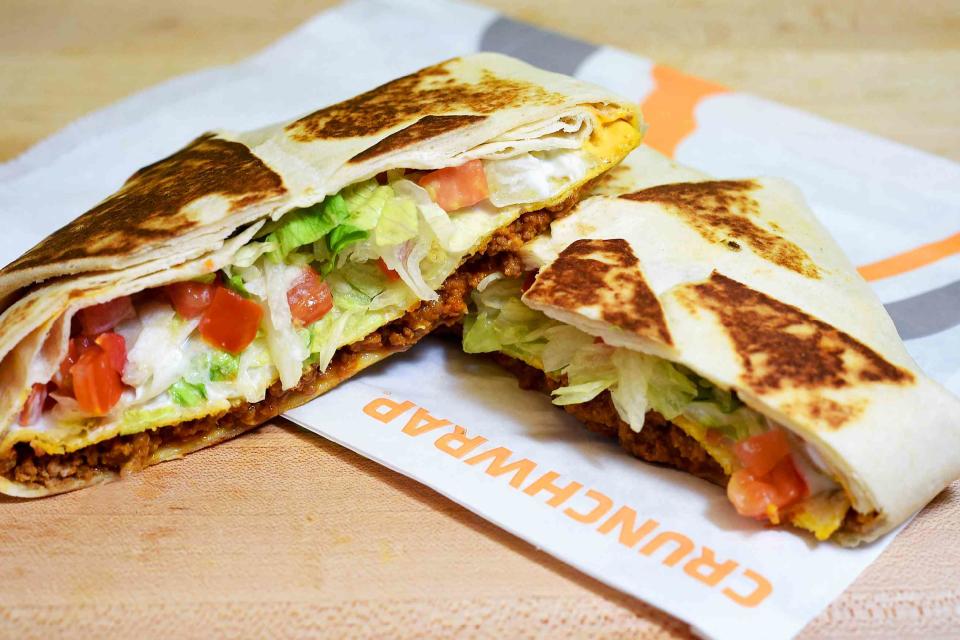Class-Action Lawsuit Claims Taco Bell Crunchwraps Should Come With More Beef
An underwhelmed customer is taking the chain to court over the photos of its items versus the real thing.

Joshua Blanchard / Getty Images
A Ridgewood, New York man went on a Taco Bell run last September and, in addition to his Mexican Pizza, the restaurant allegedly served him the basis for a class-action lawsuit. After paying $5.49 for his Mexican Pizza, Frank Siragusa looked at what he unwrapped, compared it to the photos of the Mexican Pizza he’d seen online and in the restaurant, and decided that he’d been given about half the filling the chain advertised.
Due to that allegedly underwhelming order — and some allegedly underfilled Crunchwraps — Siragusa sued Taco Bell, accusing the company of “‘unlawful’ deceptive acts and practices“ and of “misleadingly, inaccurately, and deceptively” presenting its Mexican Pizzas and Crunchwraps in photos and advertisements. The Taco Bell products mentioned in the lawsuit (and categorized as “Overstated Menu Items”) include the Crunchwrap Supreme, Grande Crunchwrap, Vegan Crunchwrap, Mexican Pizza, and Veggie Mexican Pizza.
The lawsuit argues that Taco Bell’s ads are “unfair and financially damaging” to customers who are not getting the amount of beef, beans, or other fillings that they paid for; they’re causing customers to order food that they wouldn’t have otherwise ordered; and that the photos of those menu items are also luring customers away from competitors’ restaurants.
“Taco Bell’s actions are especially concerning now that inflation, food, and meat prices are very high and many consumers, especially lower-income consumers, are struggling financially,” the lawsuit adds. The lawsuit is seeking damages $500 per item sold between July 31, 2020 and whatever ends up being the final day of disposition for the legal action.
In addition to asking for financial compensation to any customer who bought Mexican Pizzas or Crunchwraps, Siragusa also wants Taco Bell to stop using “unfair and materially misleading advertising” for its menu items.
Related: Need a Quick 5 Bucks? A&W Owes You Money Over Misleadingly-Labeled Root Beer
"Taco Bell does not adequately disclose the weight of the beef or filling," one of Siragusa’s attorneys, Anthony Russo, told Reuters. "Plaintiff did not make any purchases of the product based on any weight disclosure but solely based on the picture of the product, as we believe most consumers do."
(Taco Bell did not immediately return a request to comment on the pending litigation.)
Last year, Russo and James Kelly, Siragusa’s other attorney, represented a Florida man when he filed a similar lawsuit against Burger King. In that lawsuit, the customer was disappointed by a Burger King burger that was smaller than it appeared in photos. According to the legal filing, Burger King’s ads depicted the burger with “oversized meat patties and ingredients that overflow over the bun to make it appear that the burgers are approximately 35% larger in size, and contain more than double the meat.” (Reuters reports that this lawsuit eventually went to mediation, but the two sides did not reach an agreement.)
Russo and Kelly were also the attorneys for another defendant in their lawsuit against both McDonald’s and Wendy’s over the sizes of those burgers. That case is still pending.
For more Food & Wine news, make sure to sign up for our newsletter!
Read the original article on Food & Wine.

